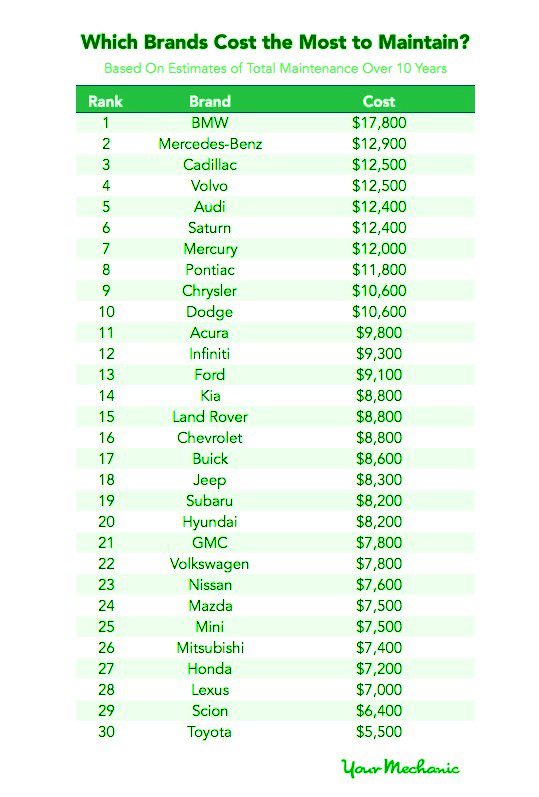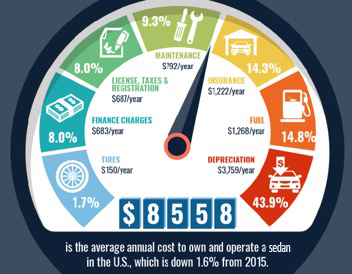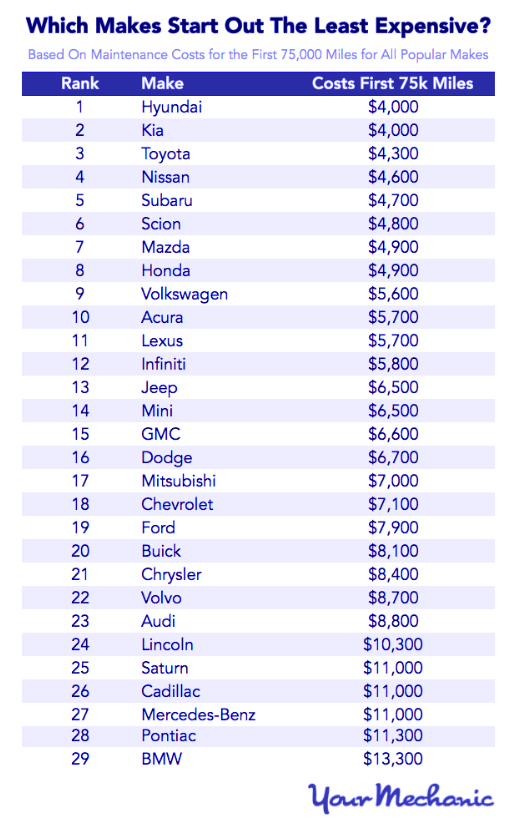When it comes to owning a car, there’s a lot more to consider than just the initial purchase price. You’ve probably thought about how much you spend on fuel and maybe even insurance, but what about maintenance?
Understanding the average car maintenance costs can save you from unexpected expenses and stress. Imagine being able to budget better, avoid costly surprises, and keep your car running smoothly. This knowledge can empower you to make informed decisions that could save you money in the long run.
Curious about how you can maintain your vehicle without breaking the bank? Let’s dive into the numbers and strategies that could transform how you handle car maintenance.

Credit: theclunkerjunker.com
Factors Influencing Maintenance Costs
Car maintenance costs vary widely. Several factors influence these expenses. Understanding these can help budget effectively. From your car’s age to its geographic location, each aspect plays a crucial role. Knowing these factors can save you money.
Vehicle Age And Condition
Older cars often need more maintenance. Parts wear out over time. Newer cars usually have fewer issues. A well-maintained vehicle lasts longer. Regular check-ups prevent major problems. A car’s history affects repair costs.
Make And Model Variations
Different car brands have different maintenance needs. Luxury models may have higher costs. Parts for rare models can be expensive. Some brands offer cheaper parts. Consider your car’s make when estimating costs.
Geographical Location
Where you live impacts maintenance costs. Urban areas might charge more for labor. Rural areas often have lower prices. Weather conditions affect vehicle wear and tear. Coastal regions may see more rust issues. Climate influences maintenance frequency.

Credit: www.crsautomotive.com
Common Maintenance Expenses
Maintaining a car isn’t just about fueling it and hitting the road. It’s a commitment to ensuring your vehicle runs smoothly, safely, and efficiently. Common maintenance expenses can sneak up on you if you’re not prepared. Knowing these costs upfront can help you budget effectively and avoid unexpected surprises. Let’s dive into some of the most frequent maintenance expenses you’re likely to encounter.
Oil Changes And Fluid Top-ups
Oil changes are essential for keeping your engine healthy. Regularly changing the oil ensures lubrication, reduces wear, and prevents overheating. It’s like giving your car a refreshing drink to keep it running smoothly.
Every few months, your car will need fresh oil and a new filter. Expect to spend around $30 to $75, depending on your vehicle’s needs and the type of oil you choose.
Don’t forget fluid top-ups. Check and refill coolant, brake fluid, and transmission fluid to prevent expensive repairs. These small expenses can save you big bucks in the long run.
Brake System Maintenance
Your brakes are vital for safety. Regular checks and maintenance are necessary to avoid costly repairs or dangerous situations. Brake pads wear down and need replacing every 20,000 to 50,000 miles, costing between $100 to $300.
Consider the rotor. Warped or damaged rotors can lead to brake issues and might need replacing, with costs ranging from $200 to $400.
Do you hear squeaking or grinding? Don’t ignore it. Early detection can prevent more significant issues and save you money. Always keep your brake system in check.
Tire Rotation And Replacement
Tires are your car’s connection to the road. Regular rotation ensures even wear and extends their lifespan. This simple service costs about $20 to $50 and can be done during an oil change.
Plan for eventual replacement. Tires typically last 25,000 to 50,000 miles. When it’s time, you’ll spend around $400 to $800 for a set, depending on your car and tire quality.
Why not check your tire pressure monthly? Proper inflation improves fuel efficiency and safety, helping you avoid unnecessary expenses. Keep your tires in top shape to enjoy a smoother ride.
Does your car maintenance budget cover these expenses? If not, it might be time to reassess your financial planning. Staying informed about these costs can help you plan better and keep your car in excellent condition. Are there any maintenance costs that surprise you?
Cost-saving Maintenance Tips
Regular car maintenance can keep costs low. Simple tasks like oil changes and tire checks help prevent expensive repairs. Maintaining your car wisely saves money over time.
Cost-saving maintenance tips help keep car expenses in check. Many overlook simple strategies that can save money over time. By following these tips, you can maintain your car’s health without breaking the bank.
Regular Inspection Schedule
Regular inspections prevent costly repairs. Schedule checks every few months. Look for signs of wear and tear. Address minor issues early to avoid major problems. Keep track of fluid levels, tire pressure, and brake condition. A consistent inspection routine extends your car’s lifespan.
Diy Maintenance Tasks
Some tasks don’t need a mechanic. You can change air filters at home. Replacing windshield wipers is simple too. Learn to check and refill fluids. These small tasks save both time and money. Online tutorials offer step-by-step guides. Gain confidence and keep your car running smoothly.
Utilizing Warranties And Insurance
Warranties cover many repairs. Check what your warranty includes. Use it when parts fail unexpectedly. Insurance can also cover certain damages. Review your policy to understand its benefits. Knowing your coverage options saves money on repairs. Always keep warranty and insurance documents handy.
Budgeting For Unexpected Repairs
Planning for surprise car repairs can ease financial stress. Average car maintenance costs often include parts and labor. Regular savings for these expenses can help manage unexpected bills.
Unexpected car repairs can throw a wrench in your budget. It’s not just the frustration of dealing with a broken-down vehicle; it’s the financial stress that catches many off guard. Planning for these unforeseen costs is crucial to avoid last-minute scrambles for cash. How can you prepare for something you can’t predict? Let’s dive into practical ways to budget for those unexpected car repair bills.
Setting Up An Emergency Fund
Creating an emergency fund is your first line of defense against surprise expenses. Even a small contribution each month can grow into a substantial safety net. Think about the last time your car needed an urgent repair. How did it impact your wallet? Now imagine having a fund specifically for such emergencies. It’s peace of mind knowing you’re covered. Start by setting aside a fixed amount each month. Consistency is key. It doesn’t have to be a huge sum; even $50 a month can make a difference over time. You could use a separate savings account for this purpose to keep things organized.
Understanding Repair Coverage Options
Have you considered extending your car’s warranty or purchasing repair insurance? These options can mitigate hefty repair costs. They’re not suitable for everyone, but for some, they provide a cushion against financial shocks. Extended warranties cover major components, saving you from sudden repair bills. However, it’s essential to understand what’s included. Some plans are comprehensive, while others are quite limited. Repair insurance can be another option. It usually covers unforeseen mechanical issues. Before purchasing, compare different providers and check their reputation. Ensure the coverage aligns with your vehicle’s needs. When was the last time you checked your car’s warranty status? Many forget to review their coverage until it’s too late. Regularly revisiting your options can save you from unexpected costs down the road. By planning ahead, you can ease the financial burden of unexpected car repairs. Are you ready to take proactive steps to protect your budget?
Choosing Cost-effective Service Providers
Choosing cost-effective service providers for car maintenance is essential. It impacts your budget and ensures your vehicle’s health. Many drivers face the dilemma of selecting between authorized dealerships and local mechanics. Each option has its advantages and challenges. Understanding these can help make informed decisions.
Authorized Dealerships Vs. Local Mechanics
Authorized dealerships have trained technicians. They use manufacturer-approved parts. This ensures high-quality service. Dealerships often have state-of-the-art equipment. They also offer warranties on repairs. Yet, their services can be expensive. Local mechanics might be more affordable. They offer personalized service. Many have years of experience. They build trust through consistent service.
Evaluating Service Quality And Prices
Quality and price go hand in hand. Compare estimates from different providers. Look at the services included. Check the reputation of the provider. Reading reviews helps assess service quality. Ask about the parts they use. Genuine parts can affect the cost. But they ensure durability. Service quality impacts your car’s performance. Choose wisely for peace of mind.

Credit: www.aaa.com
Frequently Asked Questions
What Is The Average Annual Car Maintenance Cost?
On average, car maintenance costs range from $500 to $700 annually. These costs vary based on the car’s make and model. Regular maintenance includes oil changes, tire rotations, and brake inspections. Keeping up with scheduled services can help avoid costly repairs.
It’s essential to budget for these expenses.
How Often Should I Service My Car?
Most cars need servicing every 5,000 to 10,000 miles. Regular maintenance includes oil changes, tire rotations, and brake checks. Following your vehicle’s manual ensures optimal performance and longevity. Ignoring maintenance schedules can lead to expensive repairs. Always consult your car’s manual for specific recommendations.
Does Car Age Affect Maintenance Costs?
Yes, older cars often have higher maintenance costs. Parts wear out and may need replacement more frequently. Older vehicles may lack modern technology, making repairs more labor-intensive. Regular maintenance can prevent major issues. Budgeting for these expenses is crucial if you own an older car.
What Factors Influence Car Maintenance Costs?
Car maintenance costs depend on the car’s make, model, and age. Driving habits and conditions also play a role. High-performance vehicles typically have higher maintenance costs. Regular servicing and proper care can reduce long-term expenses. Always check your vehicle’s manual for specific maintenance requirements.
Conclusion
Understanding average car maintenance costs helps in planning budgets. Regular maintenance can prevent bigger issues. You save money in the long run. Knowing typical expenses aids in better decision making. It’s important to keep your car in good shape. This ensures safety and reliability on the road.
Regular check-ups and timely repairs are wise investments. They extend your car’s lifespan. Always compare prices and services. Choose trusted mechanics and service centers. Being informed helps you avoid surprise expenses. Maintaining your car properly leads to a smoother driving experience.
Always prioritize safety and efficiency for peace of mind.
Recent Posts
Tired of manually locking your doors? We've reviewed the best must-have power door lock motor kits for an easy, modern upgrade to your vehicle.
Tired of spongy, unreliable brakes? Discover our top-rated brake cable kits and upgrade your bike for crisp, effortless stopping power.


